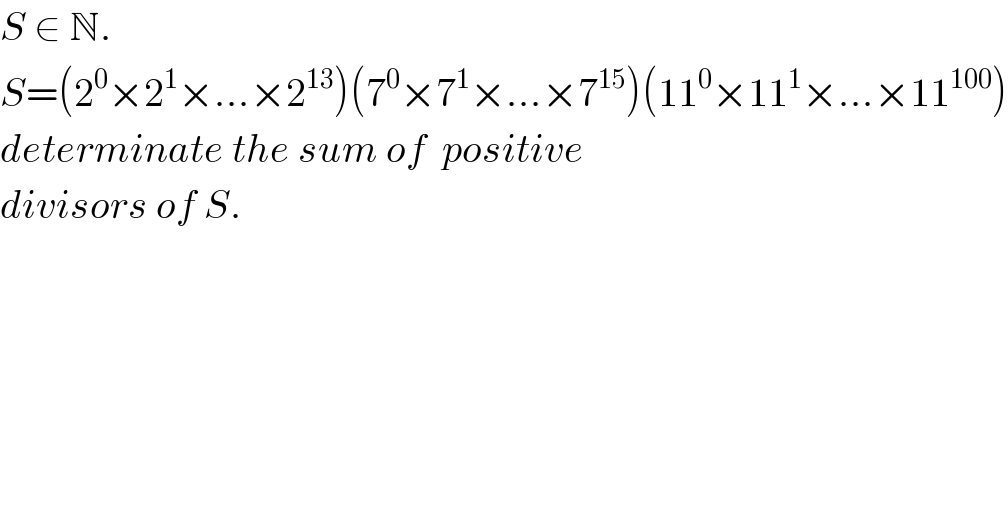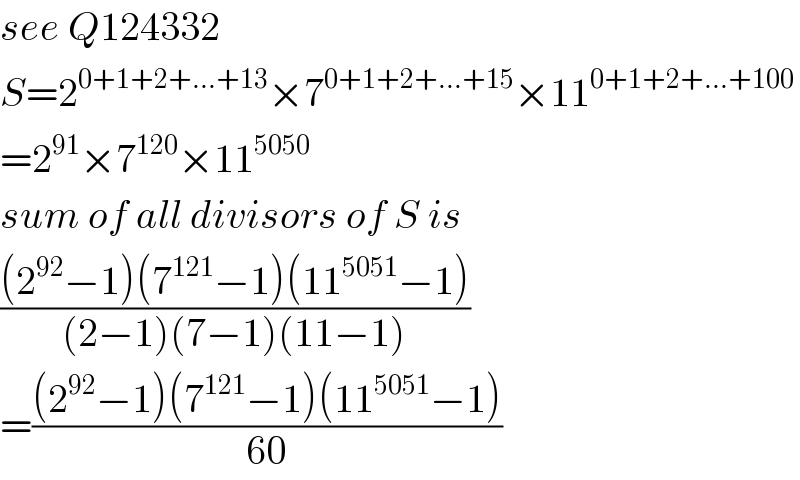
Question Number 124696 by mathocean1 last updated on 05/Dec/20

$${S}\:\in\:\mathbb{N}. \\ $$$${S}=\left(\mathrm{2}^{\mathrm{0}} ×\mathrm{2}^{\mathrm{1}} ×...×\mathrm{2}^{\mathrm{13}} \right)\left(\mathrm{7}^{\mathrm{0}} ×\mathrm{7}^{\mathrm{1}} ×...×\mathrm{7}^{\mathrm{15}} \right)\left(\mathrm{11}^{\mathrm{0}} ×\mathrm{11}^{\mathrm{1}} ×...×\mathrm{11}^{\mathrm{100}} \right) \\ $$$${determinate}\:{the}\:{sum}\:{of}\:\:{positive} \\ $$$${divisors}\:{of}\:{S}. \\ $$
Commented by mr W last updated on 05/Dec/20

$${see}\:{Q}\mathrm{124332} \\ $$$${S}=\mathrm{2}^{\mathrm{0}+\mathrm{1}+\mathrm{2}+...+\mathrm{13}} ×\mathrm{7}^{\mathrm{0}+\mathrm{1}+\mathrm{2}+...+\mathrm{15}} ×\mathrm{11}^{\mathrm{0}+\mathrm{1}+\mathrm{2}+...+\mathrm{100}} \\ $$$$=\mathrm{2}^{\mathrm{91}} ×\mathrm{7}^{\mathrm{120}} ×\mathrm{11}^{\mathrm{5050}} \\ $$$${sum}\:{of}\:{all}\:{divisors}\:{of}\:{S}\:{is} \\ $$$$\frac{\left(\mathrm{2}^{\mathrm{92}} −\mathrm{1}\right)\left(\mathrm{7}^{\mathrm{121}} −\mathrm{1}\right)\left(\mathrm{11}^{\mathrm{5051}} −\mathrm{1}\right)}{\left(\mathrm{2}−\mathrm{1}\right)\left(\mathrm{7}−\mathrm{1}\right)\left(\mathrm{11}−\mathrm{1}\right)} \\ $$$$=\frac{\left(\mathrm{2}^{\mathrm{92}} −\mathrm{1}\right)\left(\mathrm{7}^{\mathrm{121}} −\mathrm{1}\right)\left(\mathrm{11}^{\mathrm{5051}} −\mathrm{1}\right)}{\mathrm{60}} \\ $$
